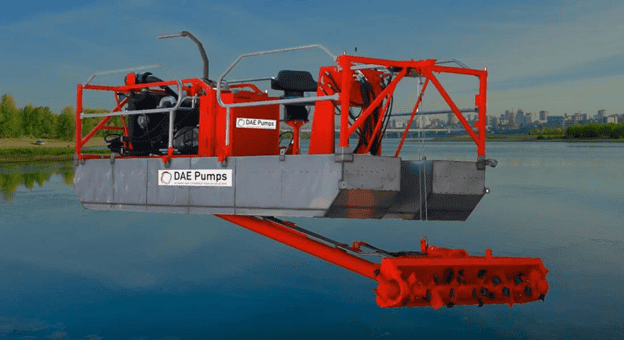Table of Contents:
- Introduction: The Silent Engine of Infrastructure Development
- Understanding Pond Dredging Equipment
- The Role of Dredging Equipment in Canadian Infrastructure Projects
- Types of Dredging Equipment for Infrastructure and Environmental Needs
- Strategic Use of Sediment Removal Equipment in Canada
- Pond Maintenance, Dredging, and Environmental Impact
- Technology and Innovation in Dredging Equipment in Canada
- Dredging Solutions for Construction Projects
- Conclusion: A Backbone for Canadian Infrastructure Growth
Source- Pump and Dredge Direct
Introduction: The Silent Engine of Infrastructure Development
Infrastructure projects serve as a basis for urban growth, economic development, and environmental management across Canada. Although bridges, highways, and skyscrapers frequently garner the most attention, pond dredging equipment is a less visible but no less important element. These specialist instruments are essential for preserving and repairing rivers, assisting with building projects, and guaranteeing the long-term viability of public works projects.
A growing number of dredging operations in Canada use pond dredging equipment. This technology supports critical infrastructure initiatives, ranging from managing stormwater ponds in metropolitan areas to removing silt in distant places. It is crucial to comprehend the benefits of dredging solutions for building projects in a nation where water systems are intricately linked to the municipal, industrial, and environmental sectors.
Understanding Pond Dredging Equipment
The process of clearing ponds, reservoirs, and other bodies of water of accumulated sediments, debris, and contaminants is known as pond dredging. Natural sedimentation and runoff can eventually weaken the capacity and efficacy of these water systems, increasing the danger of floods, lowering water quality, and deteriorating infrastructure.
Pond dredging equipment is designed to tackle these challenges through the mechanical or hydraulic excavation of sediment. Some common types include:
- Cutter suction dredgers
- Amphibious dredgers
- Hydraulic dredging pumps
- Remote-controlled dredging systems
These machines are adapted to various conditions, including shallow ponds, stormwater basins, and industrial retention areas. Their ability to remove sediments efficiently makes them indispensable in pond maintenance and dredging, particularly when infrastructure reliability is at stake.
The Role of Dredging Equipment in Canadian Infrastructure Projects
Canada’s diverse geography and climate make infrastructure projects uniquely challenging. Harsh winters, spring thaws, and fluctuating water levels require proactive sediment management strategies. Dredging equipment in Canada addresses these challenges by:
- Maintaining stormwater retention systems in urban developments
- Supporting flood control efforts in high-risk areas
- Ensuring the longevity of dams, reservoirs, and drainage channels
- Restoring water flow in culverts and engineered waterways
Pond dredging equipment enhances the performance and lifespan of critical infrastructure assets. Whether used by municipalities or private contractors, it helps ensure that Canadian dredging projects align with safety regulations, environmental standards, and engineering requirements.
Types of Dredging Equipment for Infrastructure and Environmental Needs
Depending on the environmental conditions and project size, customized dredging solutions are frequently required for infrastructure projects in Canada. Access, biological sensitivity, sediment type, and depth all affect the equipment choice.
- Industrial Dredging Applications
Used in mining, energy, and manufacturing sectors, industrial dredging equipment handles large volumes of sediment, often in remote or rugged conditions. It supports infrastructure by:
- Maintaining tailings ponds
- Clearing intake basins at energy plants
- Managing wastewater lagoons
- Environmental Dredging Solutions
Designed to minimize ecological disruption, these systems are used in conservation projects and habitat restoration. Features include:
- Low turbidity discharge
- Precision sediment targeting
- Biodegradable hydraulic fluids
Environmental dredging solutions are particularly useful in wetland restoration and areas where endangered species or aquatic vegetation must be protected.
- Waterway Restoration Equipment
This category includes dredgers used to restore natural water flow in creeks, rivers, and man-made channels. It plays a key role in:
- Reducing flood risks
- Improving fish passage
- Restoring hydrological function in infrastructure corridors
By deploying the right dredging equipment for infrastructure and environmental needs, Canadian stakeholders ensure both compliance and sustainability.
Strategic Use of Sediment Removal Equipment in Canada
The functioning of infrastructure is directly threatened by sediment buildup, which is more than simply an environmental problem. Sediment-filled reservoirs, clogged stormwater ponds, and blocked culverts can all result in expensive failures and threats to public safety.
In Canada, sediment removal equipment is strategically deployed to:
- Preserve drainage capacity in urban and suburban developments
- Protect roads, bridges, and railways from erosion and flooding
- Maintain the functionality of agricultural irrigation and drainage systems
- Ensure clean water flow through wastewater treatment infrastructure
By regularly scheduling pond dredging in Canada, municipalities and engineers mitigate long-term costs and optimize system reliability.
Pond Maintenance, Dredging, and Environmental Impact
Routine pond maintenance dredging plays a preventative role in infrastructure management. Instead of waiting for a system to fail, proactive sediment removal extends service life and reduces emergency response needs.
The environmental impact of dredging can be mitigated through:
- Timing dredging operations during low-flow or non-breeding seasons
- Using sealed transport systems to avoid contamination
- Applying sediment dewatering and reuse techniques
Environmentally conscious dredging methods are encouraged by Canadian rules, especially for infrastructure projects that are situated close to protected areas. In order to create dredging plans that strike a balance between ecological preservation and infrastructural objectives, equipment operators frequently collaborate with environmental experts.
Technology and Innovation in Dredging Equipment in Canada
The evolution of dredging technology has transformed how infrastructure projects are supported. In Canada, advancements in pond dredging equipment contribute to more efficient, accurate, and environmentally sound operations.
Notable innovations include:
- Remote Monitoring and GPS Integration
Allows real-time dredging control and mapping of sediment removal zones. - Automated Dredging Systems
Reduces labor costs and increases safety in hazardous locations. - Eco-Friendly Dredging Fluids and Components
Minimizes environmental footprint while maintaining performance. - Mobile Dredging Units
Enables rapid deployment across multiple sites, ideal for provincial infrastructure maintenance schedules.
These changes complement Canada’s larger drive towards green technology and sustainable development, in addition to meeting the growing need for dredging equipment for infrastructure.
Dredging Solutions for Construction Projects
Construction projects, particularly those involving water-adjacent development, often require integrated dredging solutions. Dredging ensures that foundational work is completed on stable ground and that drainage systems function as intended.
Examples of dredging support in construction include:
- Pre-construction site preparation in floodplains
- Clearing sediment for foundation excavation near water bodies
- Installing culverts and drainage systems
- Post-construction erosion control
Project managers can avoid delays, fines, and expensive rework by including pond dredging equipment in their planning stages. Additionally, contractors may adhere to stringent environmental permitting standards in Canada’s highly regulated construction industry by employing the appropriate dredging solutions for their projects.
Conclusion: A Backbone for Canadian Infrastructure Growth
As Canada continues to invest in its infrastructure, from transit corridors to climate-resilient communities, the role of pond dredging equipment becomes increasingly critical. Its contribution to maintaining water flow, preventing sediment-related failures, and enabling construction in complex environments cannot be overstated.
Dredging equipment in Canada is more than a tool; it is a strategic asset. Whether through environmental dredging solutions, industrial applications, or pond maintenance dredging, this technology supports the durability, safety, and sustainability of national development.
By understanding the importance of sediment removal equipment and incorporating waterway restoration equipment into project planning, Canada ensures its infrastructure is built not just to function, but to last.








